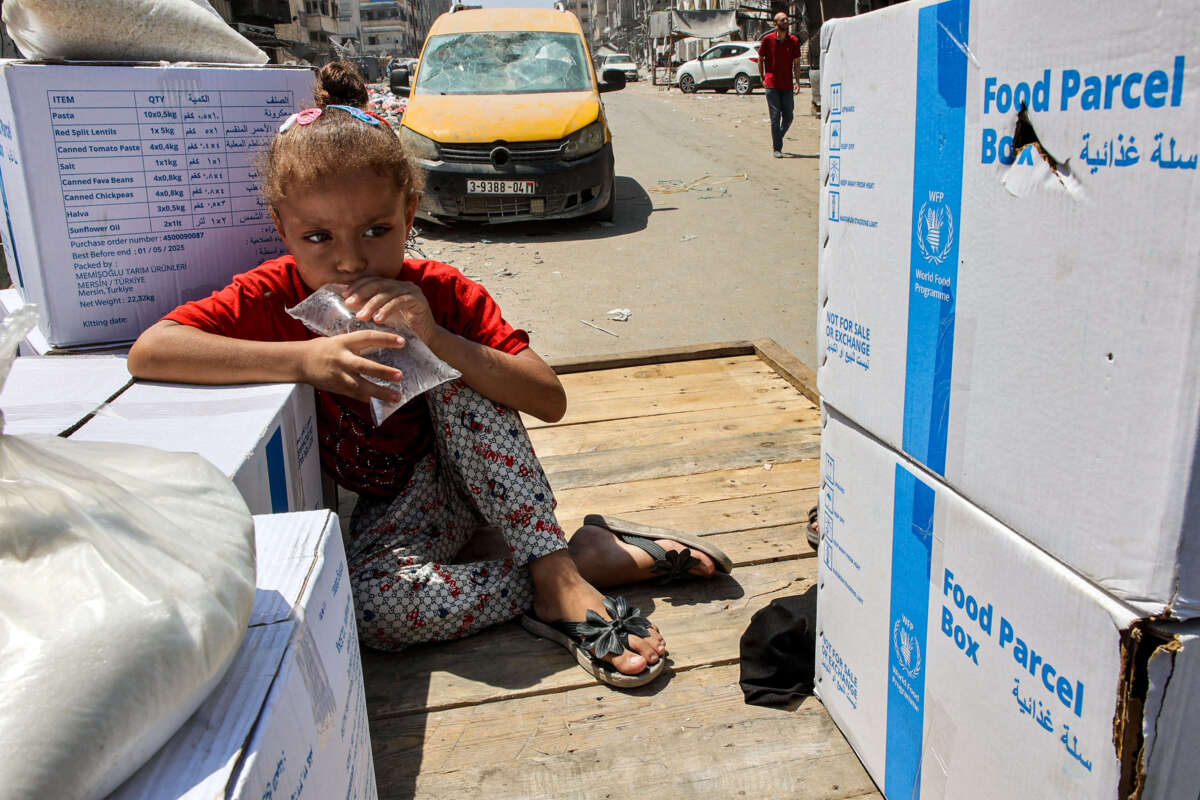Honest, paywall-free news is rare. Please support our boldly independent journalism with a donation of any size.
Israeli forces killed four people in an attack on a humanitarian aid convoy organized by a U.S.-based group on Thursday, the day after the World Food Programme announced that another Israeli attack earlier that week was forcing it to suspend movements for safety reasons.
The aid convoy organized by U.S.-based nonprofit American Near East Refugee Aid (Anera) was carrying food and fuel to a hospital in Rafah when Israeli forces struck the leading vehicle in the convoy. The convoy’s route had been organized with Israeli forces ahead of time.
The strike killed four local Palestinians who were traveling with the convoy as part of the group’s partnership with a Dubai-based company called Move One. According to Anera, the convoy was still able to finish its delivery in spite of the attack.
Israeli forces allege that the Palestinians they killed were carrying weapons, but Anera said in a statement that “every initial report from those at the scene indicate that no weapons were present” and that they were “community members” who had previously led missions with Move One. Their aim was to provide unarmed security, Anera said, because of concerns that their route was unsafe.
“According to all the information we have, this is a case of partners on the ground endeavoring to deliver aid successfully,” said Sean Carroll, Anera president and CEO, in a statement. “This should not come at the cost of people’s lives.”
Israeli forces have targeted Anera employees before. In March, Israeli forces killed an Anera employee who was staying in a shelter that was deconflicted, meaning that its location was coordinated with Israeli forces in order to avoid attack.
The strike is the latest of many on humanitarian aid convoys, including ones affiliated with internationally-based groups in the last 11 months, as Israel has targeted aid workers and carried out its deadly aid blockade.
Israel has killed over 280 aid workers in Gaza since October, and the UN has said that Gaza is the most dangerous place in the world for aid workers as a result of Israel’s violence.
Just last Tuesday, Israeli forces opened fire on a clearly marked World Food Programme (WFP) vehicle as it was approaching an Israeli checkpoint in central Gaza. Soldiers shot the car, which the group had secured multiple clearances for, 10 times.
None of the workers were hurt, but WFP announced afterward that it was suspending all staff movement in Gaza until it could get further safety assurances from Israel. WFP Executive Director Cindy McCain said that the attack was a show that the current system of Israeli clearance for humanitarian convoys clearly does not protect humanitarian workers.
Indeed, previous reports have found that Israel has repeatedly attacked known humanitarian aid worker locations.
The humanitarian crisis in Gaza only grows more acute each day. Israel nearly doubled the number of humanitarian aid missions it denied access to in August over the previous month, according to the UN.
Aid access would still be acutely restricted even if Israel cleared these convoys, however. Last week, the UN warned that Israel’s ever-expanding “combat zone” was making it nearly impossible for aid groups to travel around Gaza.
A terrifying moment. We appeal for your support.
In the last weeks, we have witnessed an authoritarian assault on communities in Minnesota and across the nation.
The need for truthful, grassroots reporting is urgent at this cataclysmic historical moment. Yet, Trump-aligned billionaires and other allies have taken over many legacy media outlets — the culmination of a decades-long campaign to place control of the narrative into the hands of the political right.
We refuse to let Trump’s blatant propaganda machine go unchecked. Untethered to corporate ownership or advertisers, Truthout remains fearless in our reporting and our determination to use journalism as a tool for justice.
But we need your help just to fund our basic expenses. Over 80 percent of Truthout’s funding comes from small individual donations from our community of readers, and over a third of our total budget is supported by recurring monthly donors.
Truthout has launched a fundraiser, and we have a goal to add 231 new monthly donors in the next 48 hours. Whether you can make a small monthly donation or a larger one-time gift, Truthout only works with your support.
